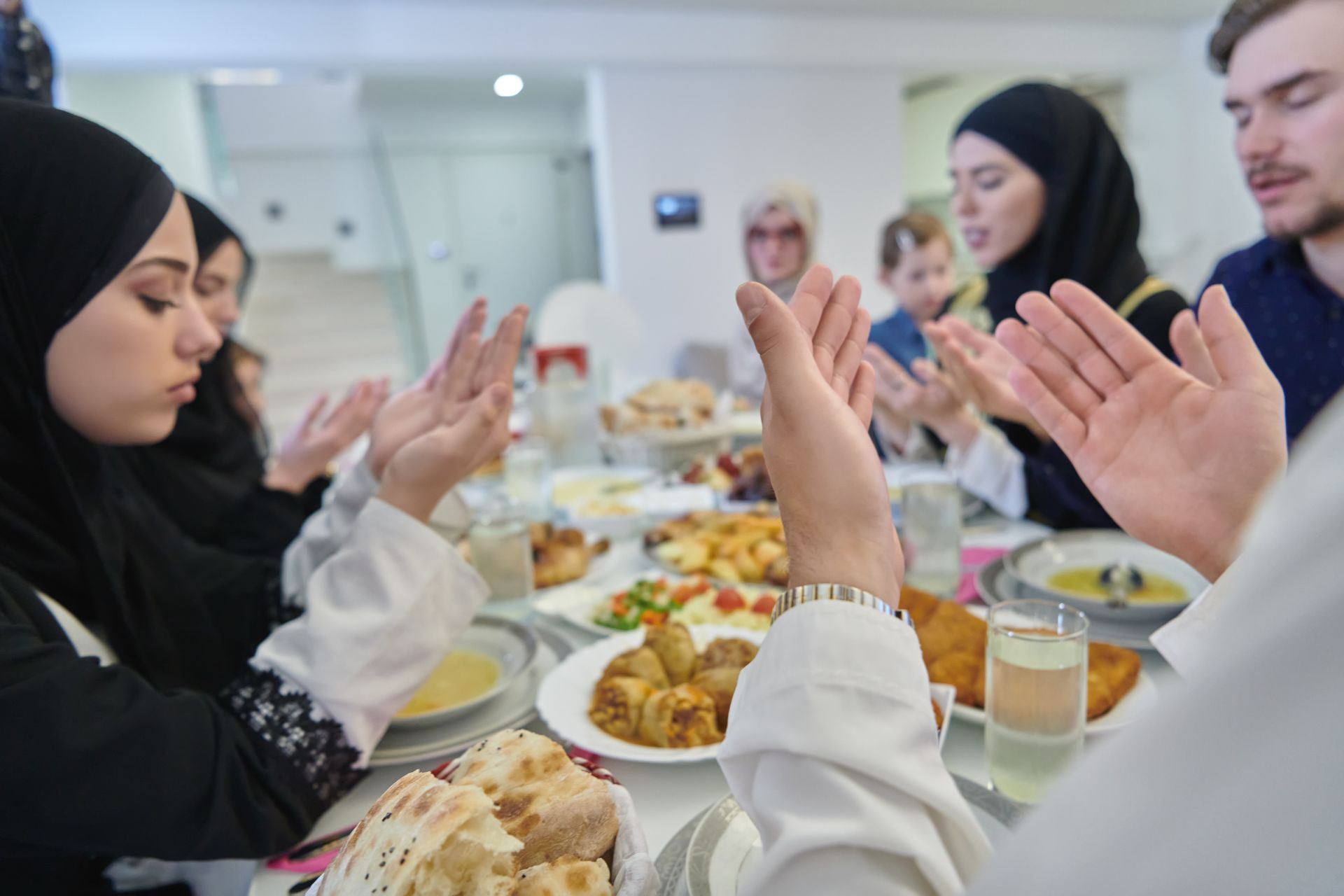Finding inner peace and blessings can be a challenging quest in our fast-paced and hectic lives.
However, there is a powerful practice that can help us connect with our spirituality and cultivate a sense of serenity – dua for eating. In this article, we will explore the immense benefits of incorporating dua, or supplications, into our daily meals.
Dua for eating is not just a ritual; it is a way to acknowledge and express gratitude for the blessings we receive through food.
It allows us to cultivate mindfulness and mindfulness, honoring the nourishment provided by the Divine. By reciting dua before and after meals, we invite blessings, seek forgiveness, and appreciate the abundance in our lives.
In addition to its spiritual significance, dua for eating also has practical benefits. It encourages us to eat mindfully, savoring each bite and avoiding overindulgence. It reminds us to thank the farmers, chefs, and everyone involved in bringing food to our tables.
So, if you are seeking a deeper connection with your spirituality and a more fulfilling mealtime experience, join us as we delve into the world of dua for eating and harness the incredible blessings it can bring.
Understanding the concept of dua
Dua, also known as supplication, is a powerful practice in Islam that involves calling upon Allah and seeking His guidance, blessings, and forgiveness.
It is a means of establishing a deep connection with the Divine and expressing our gratitude for His countless blessings. Dua can be made in any language and at any time, but it holds a special significance when recited during meals.
In Islam, food is considered a sustenance from Allah, and dua for eating is a way to acknowledge and appreciate this blessing.
It is a reminder that our sustenance comes from a higher power and that we should be grateful for it. By reciting dua before and after meals, we invite spiritual blessings and deepen our connection with Allah.
The significance of dua for eating
Dua for eating is not just a mere ritual; it is a way to infuse our meals with spirituality and mindfulness.
It allows us to pause and reflect on the blessings we are about to receive. By reciting dua before eating, we acknowledge that food is not just a means to satisfy our physical hunger but also a source of nourishment for our souls.
Moreover, dua for eating reminds us of the interconnectedness of the world. It prompts us to think about the farmers who toil hard to grow the crops, the chefs who prepare the meals, and the countless individuals involved in the process of bringing food to our tables.
It instills a sense of gratitude and appreciation for everyone involved in providing us with sustenance.
Benefits of incorporating dua into your meals
Incorporating dua into our meals can have numerous benefits for our physical, mental, and spiritual well-being.
Firstly, it encourages us to eat mindfully and with gratitude. When we recite dua before eating, we become more aware of the food in front of us, its taste, aroma, and texture. This mindfulness helps us savor each bite and enjoy the meal to its fullest.
Secondly, dua for eating serves as a reminder to eat in moderation and avoid overindulgence.
By pausing to recite dua, we give ourselves a moment to assess our hunger levels and make conscious choices about how much we eat.
This practice promotes healthier eating habits and prevents us from overeating, which can have negative consequences for our physical health.
Additionally, dua for eating helps us develop a sense of discipline and self-control. When we make a habit of reciting dua before every meal, we train ourselves to be more mindful of our actions and thoughts.
This mindfulness spills over into other aspects of our lives, allowing us to make better choices and maintain a balanced lifestyle.
The power of gratitude in dua for eating
Gratitude is a central theme in dua for eating. When we recite dua before and after meals, we express our gratitude to Allah for the blessings He has bestowed upon us.
This act of thankfulness not only strengthens our connection with the Divine but also brings us closer to inner peace and contentment.
Gratitude has the power to shift our focus from what is lacking in our lives to what we already have.
By acknowledging and appreciating the abundance of food on our plates, we cultivate a sense of satisfaction and fulfillment. This positive mindset can have a profound impact on our overall well-being and outlook on life.
Moreover, expressing gratitude through dua for eating can help us develop a more positive relationship with food.
Instead of viewing it as a source of calories or a means to an end, we begin to see it as a gift from Allah, meant to nourish and sustain us. This shift in perspective can lead to a healthier and more balanced approach to eating.
Steps to practice dua for eating
Practicing dua for eating is a simple yet meaningful way to incorporate spirituality into our daily lives. Here are some steps you can follow to make dua a regular part of your meals:
1. Set the intention: Before you start eating, remind yourself of the significance of dua for eating. Set the intention to recite dua and connect with Allah during your meal.
2. Begin with Bismillah: Start your meal by saying “Bismillah” (In the name of Allah). This is a way to seek blessings and invoke the name of Allah before partaking in the food.
3. Recite dua before eating: Take a moment to recite a dua of your choice before you start eating. You can find various dua for eating in Islamic literature or create your own heartfelt supplication expressing gratitude and seeking blessings.
4. Eat mindfully: As you eat, be present in the moment and savor each bite. Pay attention to the flavors, textures, and smells of the food. Eat slowly and enjoy the nourishment provided by Allah.
5. Recite dua after eating: Once you have finished your meal, recite a dua of gratitude for the food you have consumed. Thank Allah for His blessings and ask for forgiveness for any shortcomings.
Examples of Dua for eating
There are several dua for eating that you can incorporate into your meals. Here are a few examples:
1. “Allahumma barik lana fi ma razaqtana waqina ‘adhaban-nar” (O Allah, bless what You have provided us and protect us from the punishment of the Hellfire).
2. “Alhamdulillahilladhi at’amana wa saqana wa ja’alana min al-Muslimin” (Praise be to Allah who has fed us and quenched our thirst and made us among the Muslims).
3. “Allahumma lakal-hamdu kama amarta, fa a’timma alayna min barakatika wa rizqika” (O Allah, for You is all praise as You have commanded, so grant us the blessings and provisions from Your bounty).
Feel free to choose a dua that resonates with you or create your own heartfelt supplication.
Tips for making dua a habit during meals
Making dua a habit during meals can be a transformative practice that brings peace and blessings into your life. Here are some tips to help you make dua a regular part of your mealtime experience:
1. Be consistent: Make a commitment to recite dua before and after each meal. Consistency is key to forming a habit, so try to make it a non-negotiable part of your daily routine.
2. Set reminders: If you often forget to recite dua, set reminders on your phone or place sticky notes on your dining table as a visual cue.
3. Involve your family: Encourage your family members to join you in reciting dua for eating. This can create a sense of unity and reinforce the importance of spirituality in your household.
4. Reflect on the blessings: Take a moment to reflect on the blessings in your life as you recite dua. Think about the food on your plate, the people who contributed to it, and the privilege of having access to nourishment.
5. Practice gratitude throughout the day: Extend the practice of gratitude beyond mealtime. Throughout the day, make a conscious effort to express gratitude for the blessings in your life, big and small.
Exploring the spiritual and psychological benefits of dua for eating
Practicing dua for eating goes beyond the realm of spirituality; it also has psychological benefits that can enhance our overall well-being.
When we recite dua before and after meals, we create a space for mindfulness and reflection. This practice allows us to slow down, be present in the moment, and cultivate a sense of inner peace.
The act of reciting dua can serve as a form of meditation, helping us quiet our minds and find solace in the presence of Allah.
It provides an opportunity to connect with our spirituality and seek comfort and guidance in times of stress or turmoil.
Moreover, dua for eating can have a positive impact on our relationship with food and our body image.
By acknowledging the blessings of food and expressing gratitude, we shift our focus from external appearance to internal nourishment.
This shift in perspective fosters a healthier relationship with food and promotes self-acceptance and self-love.
Conclusion: Embracing the blessings of dua for eating
In our fast-paced and chaotic lives, finding inner peace and blessings can seem like an elusive goal. However, by incorporating dua for eating into our meals, we can tap into the spiritual power of gratitude and mindfulness.
Dua for eating allows us to connect with Allah, express our gratitude, and cultivate a sense of serenity and contentment.
Through dua, we acknowledge that food is a gift from Allah and that we are blessed to have it. We develop a more mindful and appreciative approach to eating, savoring each bite and avoiding overindulgence.
Dua for eating also reminds us of the interconnectedness of the world and the countless individuals involved in bringing food to our tables.
So, let us embrace the practice of dua for eating and harness its incredible benefits. Let us make every meal a moment of gratitude, reflection, and spiritual connection. By doing so, we can find inner peace, blessings, and a deeper sense of fulfillment in our lives.




